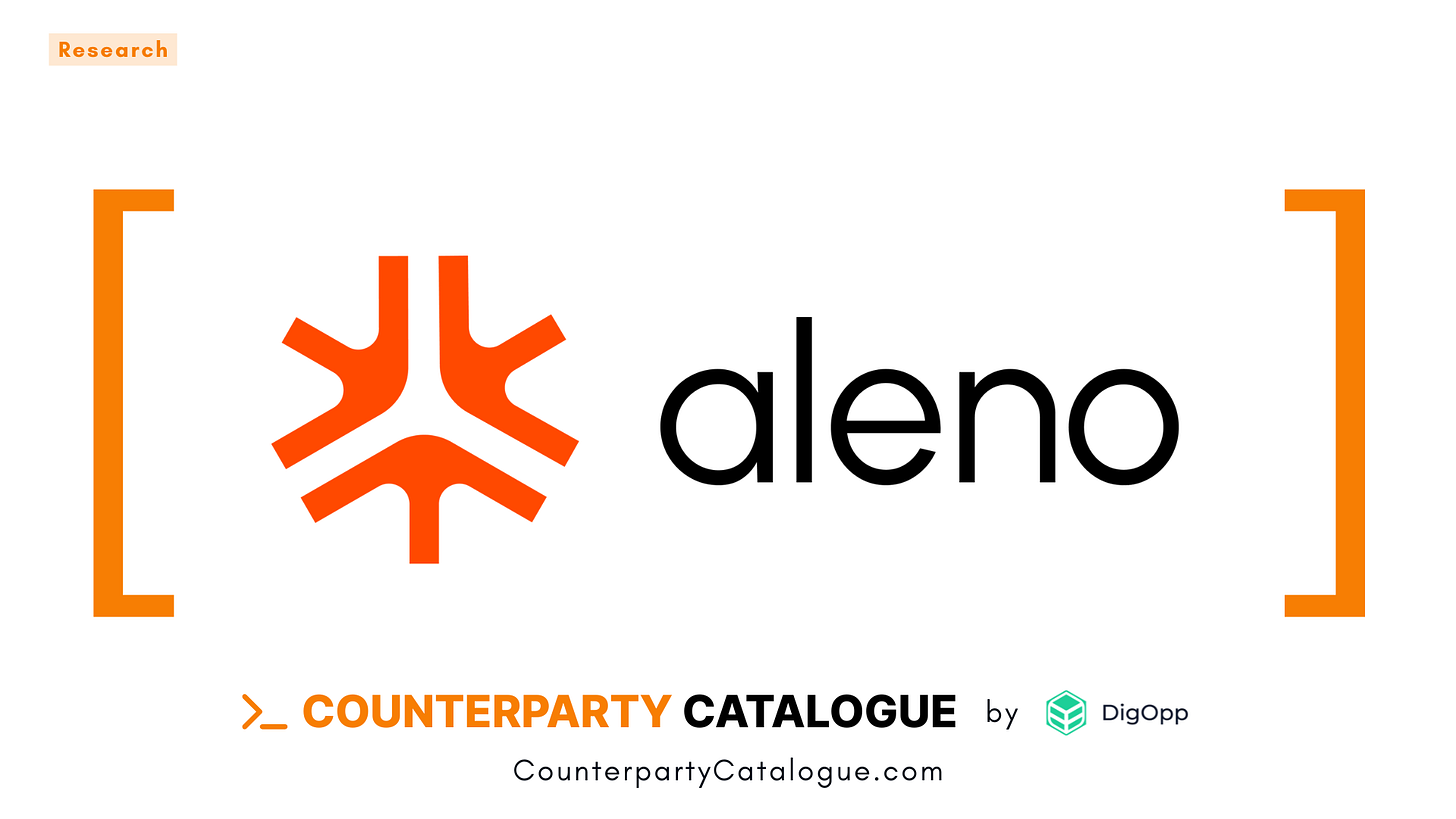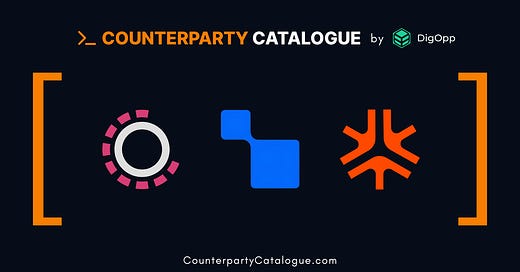Attractive return opportunities and efficiency gains are driving institutional adoption of digital assets, but what does “institutional adoption” actually mean? In this newsletter, we compile insights from industry participants and provide our own color. This week’s commentary centers around institutions exploring DeFi and stablecoin yields, evolving banking relationships, and European custody-related regulations.
Spotlights
Cordial Systems

Cordial Systems offers self-custodial infrastructure for digital assets, giving institutions the flexibility to run all of custody processes locally while maintaining full control over governance and security.
Industry Take: Diverging Standards, Traditional vs Crypto-Native Markets
“In the EU, there’s a big drive for self-hosted wallet infrastructure to meet various risk and compliance needs both in the MiCA world and also MiFID for on-chain capital markets.
For our on-chain capital markets customers, such as those focused on RWAs and tokenization, there’s a growing emphasis on the details of post-trade capabilities. This includes attention to time stamping, data feeds and sources, as well as reporting.
This highlights a bifurcation between the needs and expectations of traditional capital markets moving on-chain, and that of pure cryptocurrency financial market infrastructure as we’ve known it to be in the last few years. The pure crypto segment tends to focus on delivery vs payment (DvP) settlement at face value, using a transaction hash of physical delivery as validation, with less emphasis on the post-trade lifecycle details required to ensure execution and settlement happen correctly. The definition of ‘correct’ varies depending on the regulatory regime or the handbook of a trading venue.”
— Sebastian Higgs, COO & Co-Founder
BlockFills

BlockFills is a digital asset trading and financial technology firm offering OTC trading, market access, and liquidity solutions. Their platform supports automated execution, real-time risk management, and multi-asset trading capabilities for institutional clients.
Industry Take: TradFi Hedge Funds in Search of Yield
"A key trend over the last 12 months has been a real interest from TradFi hedge funds entering the crypto ecosystem, with a focus on gaining exposure to DeFi, in an efficient and safe manner. The latest PwC report says 29% of traditional hedge funds are now investing in crypto, up from 21% the year before. Crypto-native hedge funds returned 35% on average in 2023, compared to 11% for traditional hedge funds. Its a search for yield, edge, and expanding the breadth of assets these hedge funds want to trade.
Everyone and their mother has a stablecoin now. On Crypto Morning, I’m reporting on a new stablecoin a day. Stablecoins are great for facilitating day to day activities. However, they haven’t earned yield in the past. As the ecosystem develops, you’re seeing institutions like Franklin Templeton and BlackRock having tokenized money market funds that offer daily yield opportunities, like a checking account for crypto so to speak. Trading firms are looking at how to incorporate stablecoins that earn yield and post as collateral and margin. Really the battle is waiting for adoption, trading firms want stablecoins that their counterparties also accept.”
— Katy Allen, SVP of Institutional Sales & Business Development
Aleno

Aleno is an on-chain market data provider offering real-time data and custom-built solutions for DeFi asset managers, oracles, and institutional teams. Their bespoke development services are tailored to support complex DeFi and cross-chain needs.
Industry Take: Banks Embrace DeFi, Ethereum Remains the Benchmark
“We observe that the ecosystem is increasingly shifting towards banks across our various clients:
Banks are building closer relationships with DeFi Asset Managers to better understand the intrinsic mechanisms of DeFi.
Oracles are deeply adapting their products to meet banks’ expectations, and some banks are already pushing their data feeds into Oracle networks.
On the blockchain side, the ecosystem is moving toward increasingly faster solutions, such as megaETH and Fogo, which are expected to launch soon. Meanwhile, the majority of TVL still remains on Ethereum, due to the lack of solutions that fully meet professional requirements.”
— Antoine Vales, CEO
DigOpp’s Take
Here are some thoughts from our team on the insights shared above.
Institutional DeFi Interest
It makes a lot of sense that institutions are becoming more interested in DeFi yields, especially those delivered by stablecoins. DeFi yields often deliver more attractive returns than their traditional counterparts. However, we see institutions facing a major hurdle: extracting these yields isn’t a straightforward risk-underwriting exercise, especially because the operational infrastructure is completely foreign to traditional finance operations. For example, a DeFi RWA platform was the victim of an $8.4M loss due to custody failures. This highlights the importance of understanding the underlying risks of the DeFi infrastructure.
EU Pressure on Custodians
The observations on European regulatory pressure on self-hosted custody infrastructure do sound fairly similar to the SEC’s SPBD (Special Purpose Broker Dealer) guidelines in the U.S., which mandate firms to maintain full control of all technical aspects. Whether mandating full on-prem custody infrastructure is a good thing should be debated, but we’ll save that for later. It is interesting to consider the implications this will have on the development of the crypto custody industry. Many custodians are already offering pseudo-white-labeled solutions to support on-prem deployment, and we expect this trend to certainly pick up if regulators continue in this direction.
That’s it for this week - stay tuned for more insights in next week’s issue.
Want to be featured or have your profile highlighted on Counterparty Catalogue? Contact us at info@digopp.group or sign up here to get started.
What is Counterparty Catalogue?
Counterparty Catalogue is a discovery platform built for institutional investors to navigate the crypto ecosystem, now featuring over 100 service provider profiles across custody, trading, legal, and more.
What You Can Do:
Explore Counterparty Profiles: Discover key details on digital asset service providers, their products, and more.
Send Introductions: Easily connect with service providers and begin discussions.
Rate & Review Providers: Share feedback based on your experiences and read reviews from others.
Access ODD Reports: Request comprehensive third-party operational due diligence (ODD) reports we’ve completed:
More reports coming soon!
Coming Soon
More ODD Reports: New reports are on the way, stay tuned!
DigOpp Verifications: independent verification of all licenses, certifications, audits, and more, adding credibility and transparency to every listing.
Request for Proposals: Submit RFPs directly through the platform and receive responses from listed providers.
Disclaimer
We, Digital Opportunities Group Enterprises, Inc. are not providing investment or other advice. Nothing that we post on Substack should be construed as personalized investment advice or a recommendation that you buy, sell, or hold any security or other investment or that you pursue any investment style or strategy.
Case studies may be included for informational purposes only and are provided as a general overview of our general investment process. We have compiled our research in good faith and use reasonable efforts to include accurate and up-to-date information. In no event should we be responsible or liable for the correctness of any such research or for any damage or lost opportunities resulting from use of our data.
We are not responsible for the content of any third-party websites and we do not endorse the products, services, or investment recommendations described or offered in third-party social media posts and websites.
Nothing we post on Substack should be construed as, and may not be used in connection with, an offer to sell, or a solicitation of an offer to buy or hold, an interest in any security or investment product.





